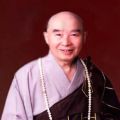Chapter 6: The Buddha's Teachings are for Everyone Recently a student came to me and asked how to practice Buddhism. The answer is the Four Universal Vows of Buddhas and Bodhisattvas: (1) Sentient beings are innumerable, I vow to help them all; (2) Afflictions are inexhaustible, I vow to end them all; (3) Ways to practice are boundless, I vow to master them all; (4) Enlightenment is unsurpassable; I vow to attain it. To help others is to do our best in assisting them to break through delusion and become awakened, then they will be able to attain true happiness and leave suffering behind. In order to help all beings escape from suffering, one should be a good cultivator, excelling in moral and academic achievements. A cultivator can learn by upholding the precepts to guard against harmful consequences created by speech, body and mind, i.e. words, deeds and thoughts. Before comprehensive learning, however, it is necessary to cultivate good virtue by ending our afflictions including greed, anger, ignorance and arrogance, as they are the sources of all desires and delusions. True wisdom arises from cultivation of high moral character, from a pure, non-discriminatory and compassionate mind, and not from knowledge gained from books. Without a pure mind, the knowledge gained leads to deviated views. Therefore, the first priority in practicing Buddhism is to purify our mind and cut off all attachments to erroneous ways. With the pure mind we can then reflect everything clearly and know all, thus attaining true wisdom and enlightenment.
Buddhism is for everyone, regardless of gender, age, occupation, nationality or religion. Everyone can learn and practice Buddhism, for it is the teaching of ultimate, perfect wisdom. There is a need for Buddha's teaching in all parts of the world. However, it is not easy to nurture Buddhist teachers. The difficulty lies with the fact that most people cannot renounce their worldly fame and wealth, which are the major obstacles in learning and practicing Buddhism. Without a pure mind, there is no way to truly understand Buddha's teachings and to realize the causes of all the problems in this world. Meanwhile, without virtue of merits and good causes and conditions, practitioners cannot find good teachers. Therefore, I always encourage young practitioners to resolve to save our country and the world.

